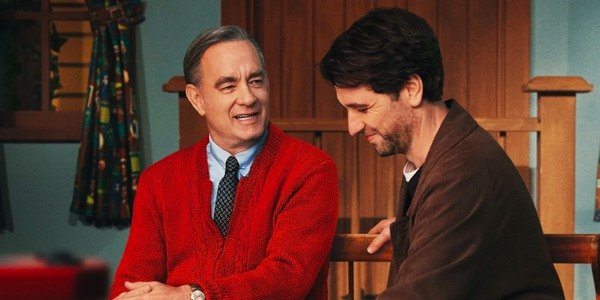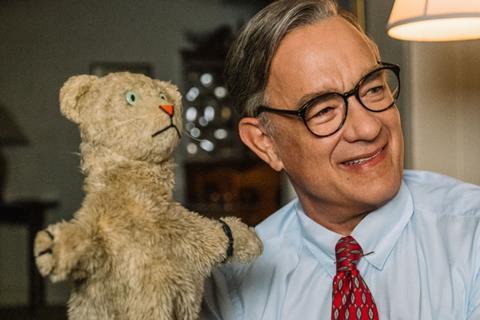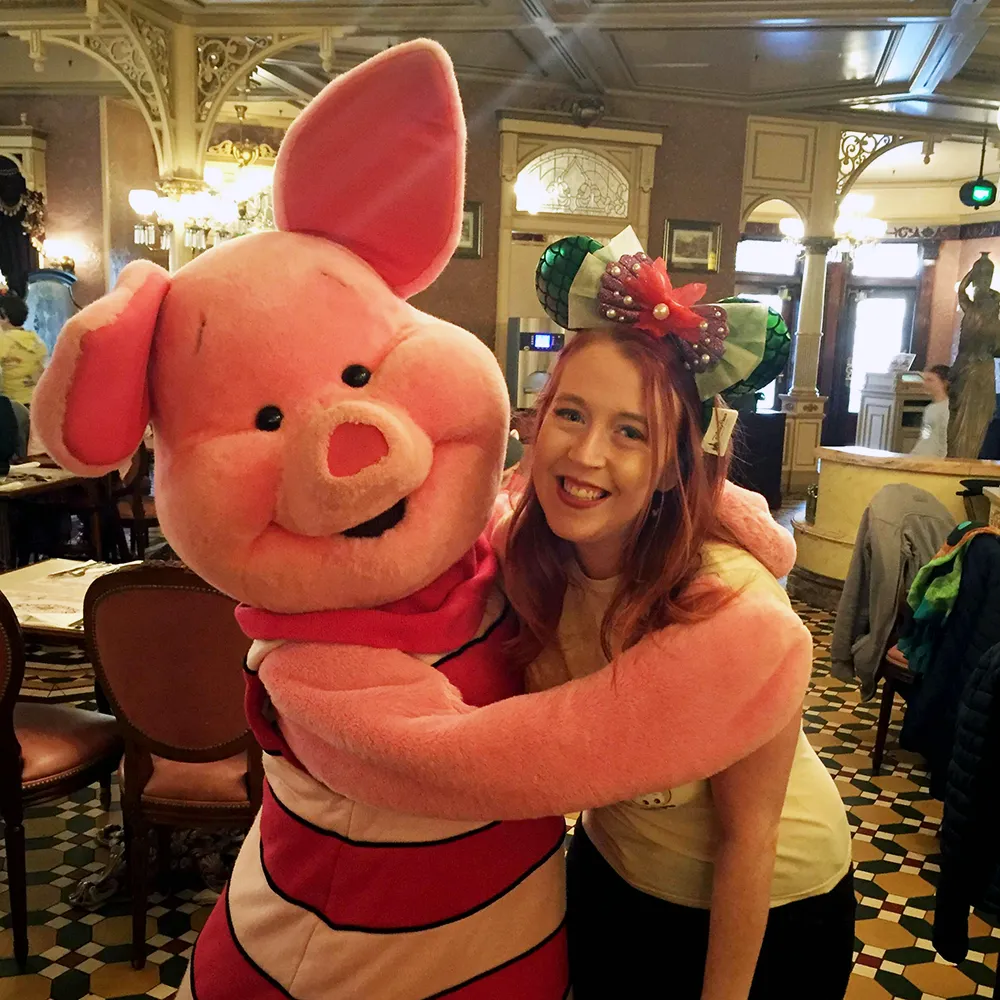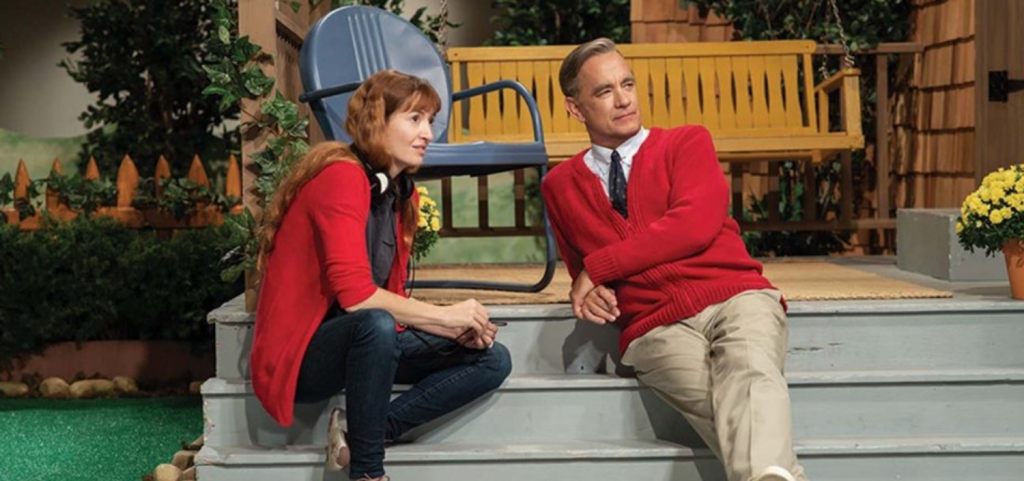In October 2019 Marielle Heller attended London Film Festival to premiere her new film A Beautiful Day in the Neighbourhood. I was lucky enough to attend the screening and following Q&A with Heller, which you can check out below.
(Contains mild spoilers. Comments have been mildly edited for clarity.)
What did Mr Rogers mean to you personally before you started working on the film?
For a lot of us, he was such an intimate part of our childhood, he was part of our earliest memories. When you see those opening moments of the little miniatures and the stoplight and the trolley, your heart leaps in to your throat because it brings you back to this very early memory. All of us grew up watching him, but truthfully, I hadn’t thought that much about him before I had a kid. As a parent, I think we were all struggling to try to figure out how to raise kind children. In the world that we’re in right now it sometimes feels very scary and his wisdom and going back to his show just felt incredibly poignant to me, as a parent.
When you first read the script can you tell us, what about it really surprised you or attracted you as a filmmaker?
The script avoided so many typical traps for a movie like this, because it was not a biopic and I thought that was so smart. A character like Mr Rogers can’t really be the lead of a movie, because he’s just good, there’s just too much good and that’s not what you need in your lead character in a movie. You need them to change and you need a major dramatic arc, but what he can be is this great instigator of change in other people and that’s what he was in real life.
There are thousands and thousands of people who essentially had this experience with Mr Rogers, who met him at some point in their life and felt like they needed something. He saw that in them and started a friendship with them and kept up with people. He wrote 100s of letters a day, he really checked in with people, prayed for people, was there for people. The number of people that we have heard from whilst making this movie who’ve said ‘that’s what he did for me, I thought I was the only one’ – truth is, he did it for a lot of people. It’s really touching.
Tom Hanks is so perfect as Mr Rogers, did you always have Tom in mind for this role and what is it in him as an actor that was so perfect?
There aren’t a lot of actors who I think we could feel a similar way about as we do Tom Hanks and Mr Rogers. I don’t know, it’s a complicated emotional thing, right? So in my mind I was like, either Tom Hanks or an actor we’ve never heard of could maybe play this part. There weren’t really any other big celebrities that I could possibly imagine that could really step in to this part.
I was only really thinking about that as we didn’t think Hanks would want to do the movie. We had heard that he was not wanting to play real people anymore, he had done that a number of times and very well. He had actually passed on this movie a few times before I signed on to direct. The producers when I signed on they said, ‘you know we’ve always dreamed of having Tom Hanks, but he’s not gonna do it.’ I said ‘well, I kind of have a relationship with him’. He had seen my first movie and we had kept in touch and he really wanted to work together, so I said ‘I’m gonna give it one last shot’. I sent him the script and I think a week later he signed on, so it was really wonderful and exciting
Matthew Rhys is the perfect compliment to Hanks. What was it about him that was so right for this role?
Matthew is one of the most sympathetic, emotionally rich actors out there. It was really important to me that whoever played this part had to have deep emotional complexity. The audience has to feel like they could be the smartest person in a room and somebody who thinks they’re too smart, to buy in to the Mr Rogers thing.
I think a lot of us have that cynicism, if Mr Rogers came out today we would probably roll our eyes, think that can’t be real, nobody could be that genuine. I know that I struggle with that within myself. In many ways I felt like Lloyd’s character represented one half of myself, and Fred represented the other half. I wanted to see what those two halves did when they got together, that fight that we all have between our cynicism and our goodness and our drive to be honest.
I was a fan of Rhys’ from The Americans and he’s a really complex actor, you always feel like so much is going on behind his eyes. It was very true that Fred would be interviewed by people and would cleverly turn the interview around on the person who was interviewing him. So suddenly, they would be crying and talking about their childhood. That was very true and there was something about Rhys, the thought of that happening between him and Hanks just felt really right.

In the middle of the film, Mr Rogers declares we’re going to take a minute of silence. That was an extraordinary cinematic choice and then you actually push it and break the fourth wall. When you were planning that shot, was there any push back?
That was the first creative choice I made when I decided I wanted to take this movie. I think the way it was written in the script was that from a brief glance, you think he might be looking down the camera lens. In my mind I thought ‘no I think he’s going to look down the camera lens for a minute’. I always saw this movie as an episode of Mr Rogers for adults, that we get to be active participants in the movie. I was so clear with it that I can’t remember if anyone gave me any push back. If they did, I was so sure of what it needed to be, I felt very, very clear about that scene from the moment I began and it never changed.
Fun fact, in that scene all of the people in the restaurant were real people from Mr Rogers life. His wife is sitting there, the really Bill Eisler, all of these people who ran the show, the real Mr McFeely, his nephew. A lot of people from his life, which was all part of this bigger vision of letting the scene have this different sort of poignancy. In part what I loved about the script was that it wasn’t afraid to go to really risky, creative places. The whole device of how it sets the film up as an episode of the show, that we’re going to meet this guy through the show, I loved and it feels emotionally right.
Those of us working in post production, we’ve all seen it thousands of times but even while we were in the middle of sound mixing, I would see people just, taking a moment. It’s like you almost can’t not do it.
Before this film’s release, there was a documentary Won’t You Be My Neighbour. Was it a challenge having this out before your movie?
Won’t You Be My Neighbour I like to view as our sister project. A Beautiful Day in the Neighbourhood had actually been in the works longer than WYBMN. I remember we were already working on this movie when we found out the documentary was happening, we all looked at each other like ‘Is this going to be bad?’ and then we thought – more Fred in the world is a good thing. Truthfully, I’m friends with Morgan Neville who made that movie. We were some of the trusted people who were let in to Fred’s world and we shot in Pittsburgh and were very close with people who worked on the show with him.
We are a privileged few who got to be a part of that world so I feel very connected to the documentary. I think that movie and this movie would make a great double feature.They give you a lot of different things. WYBMN really steps you through who Mr Rogers was, how he became who he was, what went in to who he was. ABDITN shows that in practice, it shows his life mission in a daily practice which is a very different thing. If you haven’t seen the documentary, now go see it. It won’t be redundant. And if you’ve seen the documentary, I think it improves your enjoyment of our film.

How were you able to show Mr Rogers as he was, without being too earnest? Being aware of the cynicism, was that on your mind as you were depicting him?
I think the way we approached that, was reconnecting to the real Fred whenever we could. Any time we were struggling with any aspect of making the movie, it was really comforting and easy to go back to Fred. We would watch him, listen to what he had to say, or read something he had written. Then we felt an enormous swell of responsibility and privilege to make this movie about him. It’s really hard to do, it’s really hard to have 200 people in a room with giant big lights and sound recording machines and to make something feel true and honest and human. But this was just heightened even more, right? It felt like even more we had to tap in to something that was just incredibly real. Luckily, we had Fred to guide us.
Were there any specific ideas you were going for with the soundtrack?
I’ve made 3 movies, my first was set in 1976, my second movie was set in 1991, and now this in 1998. I’m very slowly inching towards modern technology and modern music, but part of why I like making movies set back then is that I like music of other eras.
I have a wonderful music supervisor who’s worked with me on all 3 movies. They help me figure out what will play, like the Nick Drake or Tracey Chapman. The Tracey Chapman is something that I listen to all the time and I feel so lucky that she allowed us to put that song in the movie. It makes me cry every time and I can’t imagine any other song in that moment.
For the score, my brother is my composer and has also made the music for all 3 of my movies. With this movie, the goal was in the same way that we approached the miniatures and our transitions between scenes. We wanted to find a way to bridge Mr Rogers world in to Lloyd’s and have it somehow feel cohesive. We took Mr Rogers and made it more. This was sort of the idea with the miniatures, we started with Mr Rogers miniatures and we go further. So my brother started with some themes from the show for the score.
If you’re familiar with the show, you’ll hear throughout the score themes from the original show broken down, expanded upon, made bigger. They’re played by an orchestra sometimes, or played by a four piece quartet. That was the jumping off point and then obviously you build up a complicated emotional score that follows the movie. It was a lot of fun to be able to go back to these songs and the through lines that came from the original show. We were lucky that the Fred Rogers Company supported us in all of those decisions.
Are the puppets the originals?
They aren’t and I’m glad you know it so well to think they might be. People who worked on the original show came in and gasped ‘are you using our puppets?’ Our team recreated them and they were hard to recreate. We had puppeteers that worked for Sesame Street who recreated the puppets meticulously and everything else. Teams recreated the set, the real set lives in a museum in Pittsburgh and we recreated everything. People who worked on the original program visited in when we were filming. You could see them lose their breath a little bit. They’d say ‘I just feel like I went back in time and it smells right’.

Ex film teacher and frequent couch potato. I try and see at least one new release a week, but I’ve somehow got to 30 without having seen The Godfather?







